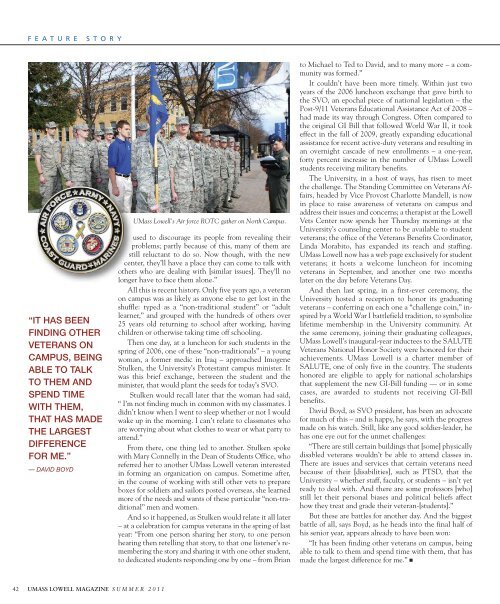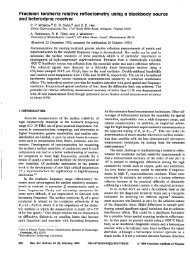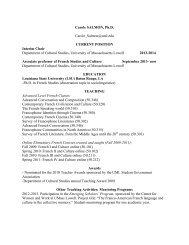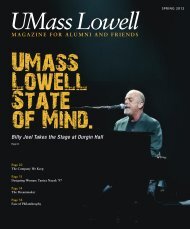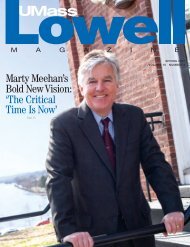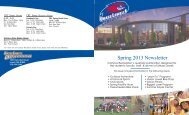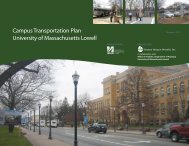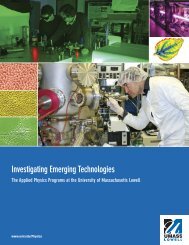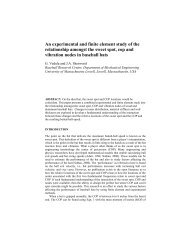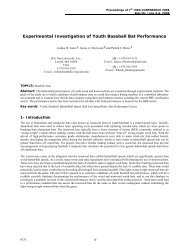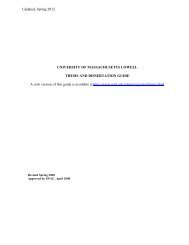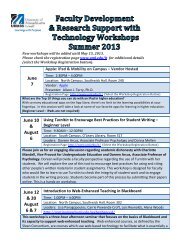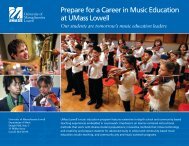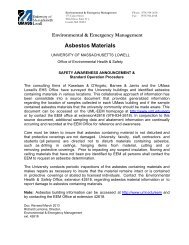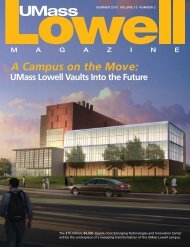Summer 2011 - University of Massachusetts Lowell
Summer 2011 - University of Massachusetts Lowell
Summer 2011 - University of Massachusetts Lowell
You also want an ePaper? Increase the reach of your titles
YUMPU automatically turns print PDFs into web optimized ePapers that Google loves.
F E A T U R E S T O R Y<br />
“IT HAS BEEN<br />
FINDING OTHER<br />
VETERANS ON<br />
CAMPUS, BEING<br />
ABLE TO TALK<br />
TO THEM AND<br />
SPEND TIME<br />
WITH THEM,<br />
THAT HAS MADE<br />
THE LARGEST<br />
DIFFERENCE<br />
FOR ME.”<br />
— DAVID BOYD<br />
UMass <strong>Lowell</strong>’s Air force ROTC gather on North Campus.<br />
used to discourage its people from revealing their<br />
problems; partly because <strong>of</strong> this, many <strong>of</strong> them are<br />
still reluctant to do so. Now though, with the new<br />
center, they’ll have a place they can come to talk with<br />
others who are dealing with [similar issues]. They’ll no<br />
longer have to face them alone.”<br />
All this is recent history. Only five years ago, a veteran<br />
on campus was as likely as anyone else to get lost in the<br />
shuffle: typed as a “non-traditional student” or “adult<br />
learner,” and grouped with the hundreds <strong>of</strong> others over<br />
25 years old returning to school after working, having<br />
children or otherwise taking time <strong>of</strong>f schooling.<br />
Then one day, at a luncheon for such students in the<br />
spring <strong>of</strong> 2006, one <strong>of</strong> these “non-traditionals” – a young<br />
woman, a former medic in Iraq – approached Imogene<br />
Stulken, the <strong>University</strong>’s Protestant campus minister. It<br />
was this brief exchange, between the student and the<br />
minister, that would plant the seeds for today’s SVO.<br />
Stulken would recall later that the woman had said,<br />
“ I’m not finding much in common with my classmates. I<br />
didn’t know when I went to sleep whether or not I would<br />
wake up in the morning. I can’t relate to classmates who<br />
are worrying about what clothes to wear or what party to<br />
attend.”<br />
From there, one thing led to another. Stulken spoke<br />
with Mary Connelly in the Dean <strong>of</strong> Students Office, who<br />
referred her to another UMass <strong>Lowell</strong> veteran interested<br />
in forming an organization on campus. Sometime after,<br />
in the course <strong>of</strong> working with still other vets to prepare<br />
boxes for soldiers and sailors posted overseas, she learned<br />
more <strong>of</strong> the needs and wants <strong>of</strong> these particular “non-traditional”<br />
men and women.<br />
And so it happened, as Stulken would relate it all later<br />
– at a celebration for campus veterans in the spring <strong>of</strong> last<br />
year: “From one person sharing her story, to one person<br />
hearing then retelling that story, to that one listener’s remembering<br />
the story and sharing it with one other student,<br />
to dedicated students responding one by one – from Brian<br />
to Michael to Ted to David, and to many more – a community<br />
was formed.”<br />
It couldn’t have been more timely. Within just two<br />
years <strong>of</strong> the 2006 luncheon exchange that gave birth to<br />
the SVO, an epochal piece <strong>of</strong> national legislation – the<br />
Post-9/11 Veterans Educational Assistance Act <strong>of</strong> 2008 –<br />
had made its way through Congress. Often compared to<br />
the original GI Bill that followed World War II, it took<br />
effect in the fall <strong>of</strong> 2009, greatly expanding educational<br />
assistance for recent active-duty veterans and resulting in<br />
an overnight cascade <strong>of</strong> new enrollments – a one-year,<br />
forty percent increase in the number <strong>of</strong> UMass <strong>Lowell</strong><br />
students receiving military benefits.<br />
The <strong>University</strong>, in a host <strong>of</strong> ways, has risen to meet<br />
the challenge. The Standing Committee on Veterans Affairs,<br />
headed by Vice Provost Charlotte Mandell, is now<br />
in place to raise awareness <strong>of</strong> veterans on campus and<br />
address their issues and concerns; a therapist at the <strong>Lowell</strong><br />
Vets Center now spends her Thursday mornings at the<br />
<strong>University</strong>’s counseling center to be available to student<br />
veterans; the <strong>of</strong>fice <strong>of</strong> the Veterans Benefits Coordinator,<br />
Linda Morabito, has expanded its reach and staffing.<br />
UMass <strong>Lowell</strong> now has a web page exclusively for student<br />
veterans; it hosts a welcome luncheon for incoming<br />
veterans in September, and another one two months<br />
later on the day before Veterans Day.<br />
And then last spring, in a first-ever ceremony, the<br />
<strong>University</strong> hosted a reception to honor its graduating<br />
veterans – conferring on each one a “challenge coin,” inspired<br />
by a World War I battlefield tradition, to symbolize<br />
lifetime membership in the <strong>University</strong> community. At<br />
the same ceremony, joining their graduating colleagues,<br />
UMass <strong>Lowell</strong>’s inaugural-year inductees to the SALUTE<br />
Veterans National Honor Society were honored for their<br />
achievements. UMass <strong>Lowell</strong> is a charter member <strong>of</strong><br />
SALUTE, one <strong>of</strong> only five in the country. The students<br />
honored are eligible to apply for national scholarships<br />
that supplement the new GI-Bill funding — or in some<br />
cases, are awarded to students not receiving GI-Bill<br />
benefits.<br />
David Boyd, as SVO president, has been an advocate<br />
for much <strong>of</strong> this – and is happy, he says, with the progress<br />
made on his watch. Still, like any good soldier-leader, he<br />
has one eye out for the unmet challenges:<br />
“There are still certain buildings that [some] physically<br />
disabled veterans wouldn’t be able to attend classes in.<br />
There are issues and services that certain veterans need<br />
because <strong>of</strong> their [disabilities], such as PTSD, that the<br />
<strong>University</strong> – whether staff, faculty, or students – isn’t yet<br />
ready to deal with. And there are some pr<strong>of</strong>essors [who]<br />
still let their personal biases and political beliefs affect<br />
how they treat and grade their veteran-[students].”<br />
But these are battles for another day. And the biggest<br />
battle <strong>of</strong> all, says Boyd, as he heads into the final half <strong>of</strong><br />
his senior year, appears already to have been won:<br />
“It has been finding other veterans on campus, being<br />
able to talk to them and spend time with them, that has<br />
made the largest difference for me.” <br />
42 UMASS LOWELL MAGAZINE S U M M E R 2 0 1 1


